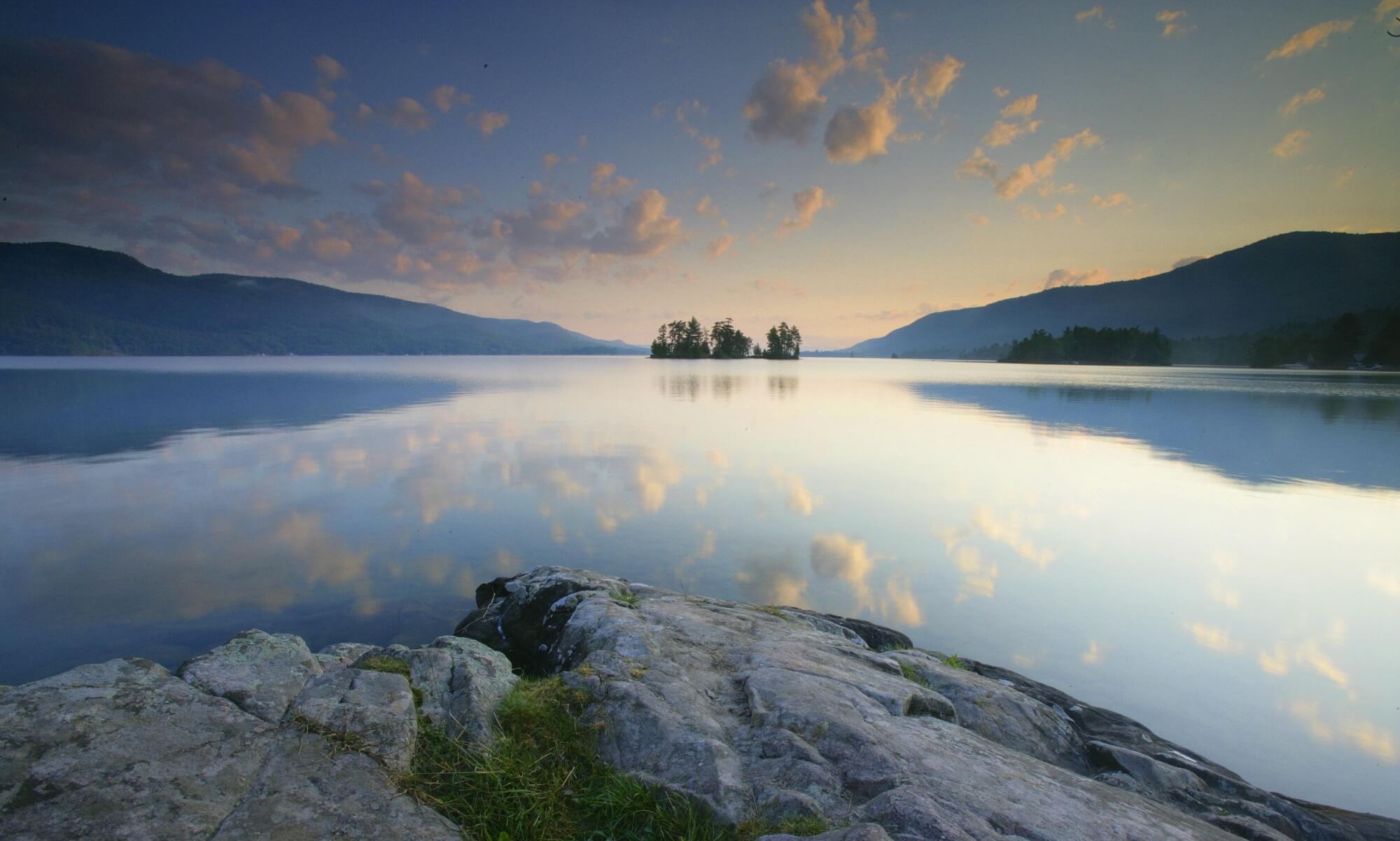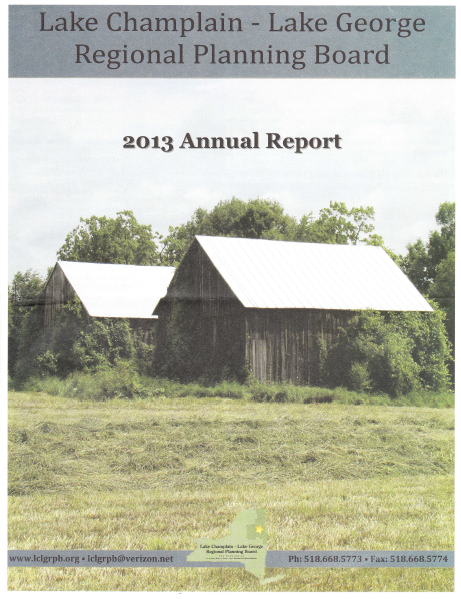Great event in Ticonderoga today launching the "Rails to Wheels" partnership between Amtrak and Fort Ticonderoga! pic.twitter.com/P5imFcABSA
— Rep. Elise Stefanik (@RepStefanik) May 22, 2015
Rep. Stefanik Announces Winner of 2015 Congressional Art Competition
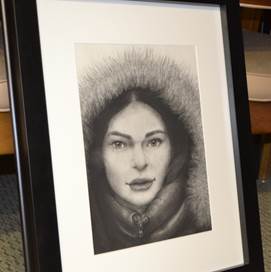
“The Beauty of a Cold Winter’s Day” by Keely O’Connor
Today, Congresswoman Elise Stefanik (R-NY-21) announced that Keely O’Connor of Carthage Central High School has won the 2015 Congressional Art Competition for New York’s 21st District for her piece, The Beauty of a Cold Winter’s Day.
“I am thrilled to announce that Keely’s piece will be displayed for a full year at the U.S. Capitol, proudly representing the talent of our North Country artists,” said Congresswoman Stefanik. “The volume of amazing art that was submitted for this contest was overwhelming and I thank each and every student that participated. The North Country is a proud home to many gifted students and I look forward to continuing this competition next year.”
Keely’s art was one of four finalists selected by a committee from 59 total pieces of art submitted to Stefanik’s Glens Falls, Watertown and Plattsburgh district offices. In addition to having her work showcased at the Capitol, Keely will also have the opportunity to visit Washington for a reception in June. The other semi-finalists will have the opportunity to have their work showcased in Congresswoman Stefanik’s district offices for the next year. To view the semi-finalists, click here.
Students Submit Entries to Congressional Art Competition
Thanks to all the gifted #NY21 high school students who submitted entries to the Congressional Art Competition! pic.twitter.com/Fmu3kLKScz
— Rep. Elise Stefanik (@RepStefanik) April 25, 2015
Bits of Everything
Expanded Lake George Trail System Eyed
The Adirondack Almanack reports on the “Trails Master Plan” for the west shore of Lake George.
New Fishing Tournament for Lake George
Grab a fishing pole and maybe you can win $2,500 in grand prize money between Friday, July 10 to Sunday, July 12th. Read in the Lake George Mirror.
Cuomo’s Quiet Medicaid Miracle?
“New York still spends more on Medicaid than California and Texas combined.” Read the NY Daily News article.
NASA JPL: Heat-Converting Material Patents Licensed to Troy Company
The future is happening now. Read the JPL Press Release.
Adirondacks Burn Ban In Effect
With fire season upon us, Dresden is covered until May 14th. So says the Adirondack Almanack.
Congresswoman Stefanik Announces 2015 Congressional Art Competition
Congresswoman Elise Stefanik (R-NY-21) has announced the 2015 Congressional Art Competition for New York’s 21st district. The Congressional Art Competition is open to all high school students in the 21st District.
“The North Country is home to many gifted students and the Congressional Art Competition is a great opportunity for them to showcase their talents,” said Congresswoman Stefanik. “The winner of this competition will have their artwork displayed in the U.S. Capitol for a year where it will be seen by visitors from around the world. I look forward to seeing what our students can create!”
Artwork entered in the contest must be original in execution, may be up to 28 inches by 28 inches, 4 inches in depth and cannot weigh more than 15 pounds. The artwork may be:
Paintings – including oil, acrylics and watercolor
Drawings – including pastels, colored pencil, pencil, charcoal, ink, and markers
Collage (must be 2 dimensional)
Prints – including lithographs, silkscreen and block prints
Mixed Media – use of two or more mediums such as pencil, ink, watercolor
Computer Generated Art
Photography
Art submissions along with a Congressional release form must be submitted to one of Congresswoman Stefanik’s district office locations no later than April 24, 2015. The Congressional release form can be found here and more information about the competitions rules and guidelines is posted here.
Fort Ticonderoga Purchases Carillon Cruise Boat
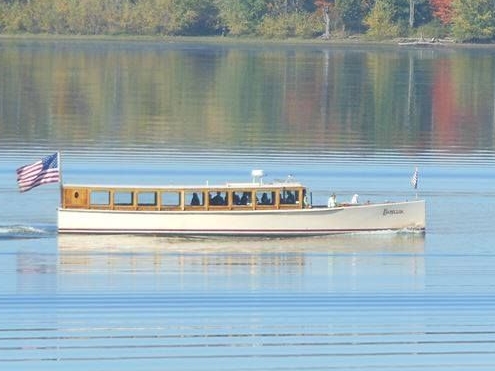
Fort Ticonderoga announced today that it has acquired the Carillon cruise boat, 60 foot replica 1920s 1000 Islands cruise boat. Plans are underway for 2015 waterway tours and programs at Fort Ticonderoga.
Fort Ticonderoga, a not-for-profit educational organization and major cultural destination, announced today that it has purchased the Carillon cruise boat, formerly located on the shores of Lake Champlain in Shoreham, Vermont. Waterway tours will be offered by Fort Ticonderoga beginning in the spring of this year. The acquisition of the boat is part of a larger Fort Ticonderoga waterway recreation and transportation initiative that is anticipated to continue to develop over the next several years.
“Fort Ticonderoga is thrilled to have the opportunity to expand its cultural destination experience to the internationally significant waters of Lake Champlain. The lake is a tremendous asset for our region and with Fort Ticonderoga’s 2 miles of shoreline and story that is intricately linked to Lake Champlain, the development of a water experience is an obvious next step in our program development,” said Beth Hill, Fort Ticonderoga President and CEO. “Thanks in part to a New York Empire State Development grant and other generous supporters, Fort Ticonderoga’s waterway experience will expand our tourism demographic, increase the length of stay of our guests, connect our historic properties on both sides of Lake Champlain, and highlight Ticonderoga’s epic story in a new and exciting way. We are particularly enthusiastic about this project as it is directly linked with a Town of Ticonderoga priority to increase access and waterway experiences through tourism development.”
“We are extremely pleased to acquire this iconic vessel,” said Sanford W. Morhouse, Fort Ticonderoga Chairman of the Board. “My wife and I were privileged to be guests of Captain Paul Saenger and his wife Rene, the Carillon’s prior owners, on Captain Paul’s last Carillon cruise prior to his passing. Captain Paul clearly wanted the boat to stay in the southern part of Lake Champlain, and we at Fort Ticonderoga are exceedingly pleased that we will fulfill that wish while greatly enhancing the Fort Ticonderoga experience.”
The Carillon boat, a replica of a 1920s 1000 Islands cruise boat, is a 60 foot luxury vessel previously owned by Paul and Rene Sanger. The Saengers owned and operated the boat from a dock in Shoreham, Vermont, offering scenic and educational tours in southern Lake Champlain that highlighted the region’s history, beauty, and nature. Fort Ticonderoga plans to finalize ownership of the boat this spring as it builds plans for waterway tours on Lake Chaplain for the 2015 season.
Fort Ticonderoga recently received a funding in the latest round of the New York State Regional Economic Development grant awards. The grant was awarded to Fort Ticonderoga to support the first phase of development in a waterway transportation and recreation system. Specifically, the funding will be used to construct a dock. Fort Ticonderoga continues to seek philanthropic support to fund the development of this waterway initiative and related educational programs.
Bits of Everything
The Adirondack Almanack: Lake George from Green Island Bridge
A great picture of the lake in cold weather from the bridge to the Sagamore.
NY State DEC: Adirondack Forest Ranger Search and Rescue Highlights: 12/29/14-01/04/15
You might end up in this report if you get lost in the woods.
Governor Cuomo’s 2014 End of Year Report
The actual report is 44 pages but it’s broken down by category.
Office of the State Controller, Thomas P. DiNapoli
State Pension Fund Commits Additional $50 Million
to Invest in New York-Based Companies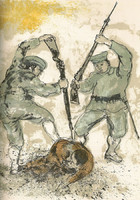
USA Today: North Korean Reality Isn’t Funny for Christians
Rep. Elise Stefanik (R-NY-21) Officially Sworn In

Rep. Stefanik being sworn in by Speaker John Boehner. (Click image to see full-scale.)
Washington, D.C. – Today, January 6, 2015, Rep. Elise Stefanik (R-NY-21) was officially sworn in to represent New York’s 21st district in the U.S. House of Representatives.
“I am thrilled and humbled by this opportunity to serve the wonderful people of New York’s 21st district,” said Congresswoman Stefanik. “I pledge to be a strong voice for our community in Congress and to work my hardest to advance bipartisan solutions. Washington is broken and now is the time for leaders to work together on behalf of the American people. I am grateful for this incredible opportunity.”
Independent Film Producer Provides Update on Movie Filmed Locally in April 2014
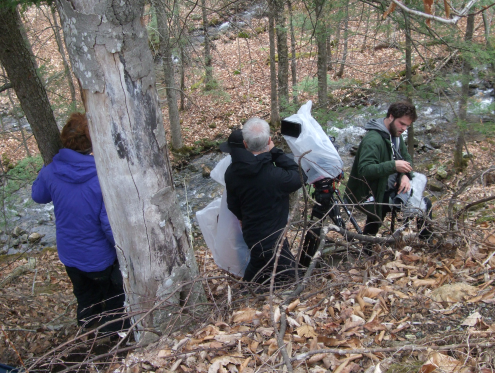
The producers and film crew making an independent short movie in and around Huletts Landing in April 2014 (seen here), recently provided an update on the movie.
Back in April, a film crew and actors descended on Huletts Landing and Whitehall, where they shot an independent short movie.
I recently heard from one of the producers, Jeremy Leach of Lost City Creative, who gave me an update on where things presently stand.
We wrapped up filming in mid/late April after thirteen days of filming. If memory serves, we spent 3 days in Brooklyn, one travel/shoot day going upstate from Brooklyn and the next nine days splitting time between Whitehall and Huletts Landing. One of our biggest concerns before heading up to Huletts was the state of the lake. I was told it had been one of the coldest winters on record and as of April 12th, our first day of production, large portions of the lake had not thawed. Because we had several scenes on the lake, this was a cause of great consternation. However, upon arriving at Huletts on April 15th (in a torrential downpour), we were relieved to find the lake had completely thawed. Apparently, it had gone out two days before we arrived!
Upon beginning the edit, we were delighted to find that many of the scenes from the film, including those filmed in and around Huletts Landing, really capture the beauty of the landscape. The scenes we filmed there are important because they are essentially the first time our main character is immersed in a completely natural environment, a significant stage in the film. We were honored to be able to work with such wonderful people both in Huletts Landing and in Whitehall before, during, and after production.
The first thing we had to do once we finished filming was to cull through and organize the many hours of footage. That took some time because we filmed several complicated scenes, many of which included a variety of long takes. Initially we were unsure of the potential length of the film but after going through all the footage and putting together some rough assembly edits, we’re thinking it could potentially be anywhere from 75 – 90 minutes long. Right now, we are working on and are close to completing a rough cut of the entire film, creating a story arc by assembling the visual building blocks of the film. From there, we will review and move on to a fine cut, where we will start incorporating more complex sound design and begin the arduous process of color correction.
Finding free time to edit while juggling work/personal responsibilities can be challenging, often resulting in a process that takes longer than expected. That said, we’re hoping we can have a finished film by early spring of 2015. After it’s finished, we’ll begin the process of submitting the film to festivals and arranging screenings. I’ll keep you updated with our progress for some follow-up posts for your blog.
An Interview with Adirondack Artist, Sandra Hildreth
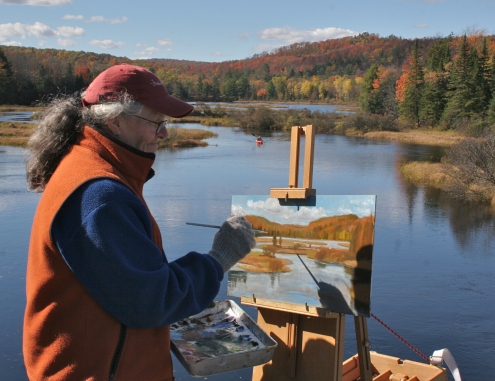
Artist, Sandra Hildreth, painting an Adirondack scene. (Photo credit: Gary Lee)
With the leaves starting to fall, I recently had a chance to interview Sandra Hildreth, who is known for her paintings and artwork which depict the Adirondacks. Below is my interview with her.
Your art captures the spirit of the Adirondacks. Could you tell us a little bit about yourself? How you came to the Adirondacks and what you try to capture in your art?
I grew up in rural Wisconsin, always playing outdoors as a child, and in a household full of art and antiques. My mother was an amateur photographer and I remember going with her to go out and photograph clouds! My family moved to Kentucky when I was in college, I finished my education there, married, and moved to northern NY when my husband joined the faculty at SUNY Potsdam. While I enjoyed the rural beauty of the St Lawrence Valley (much like Wisconsin, and I did paintings of it), I felt strongly attracted to the Adirondack Mountains. I taught high school art for 31 years and after divorcing, and my children were grown, I decided there were no reasons I shouldn’t live in the Adirondacks, so I moved to Saranac Lake in 2004. I love to hike, paddle, and ski, as well as spend time outdoors painting and I simply feel like I was meant to live here. What I try to capture in my art is just that – what I love about the Adirondack landscape. Not only the physical aspects – the forms, colors, textures, but also the qualities of rugged wilderness, and even the rich history of the area. The fact that what we see, what my paintings appear to illustrate – a vast, wild scenic landscape, was once almost lost to logging, forest fires, and increasing development. I guess I want to make people aware of the story of the Adirondacks in my paintings.
When you are painting an Adirondack scene, how do you go about creating the scene on the canvas?
I prefer, more than anything, to be outdoors, experiencing the actual place, as I recreate it on canvas. This is “plein air” painting – painting outdoors, on location – what you see, as you see it. But I put a great deal of effort into choosing where I paint – I cannot just drive down a road, park, and set up and paint. I fit all my gear into a backpack and often hike or paddle in order to find good painting spots. While I don’t always have specific things in mind, I have general things that I look for when I’m ready to do a painting. I like the beauty of the random order that nature seems to create – trees don’t grow evenly spaced, mountains aren’t perfect pyramid shapes. Good art, however, needs to be well composed – so all the elements that other artists apply to what they paint or sculpt, I look for in the landscape. Pleasing arrangements of asymmetric forms, variety – different shapes in the mountains or rocks, a harmonious range of colors, interesting textures. I often look for something strikingly unique – an interesting bend in a river, or tall snag of a dead tree. Once I choose the specific view I want to paint, I set up my easel, get my oil paints ready, and choose a canvas that will fit the composition I have in mind. Because plein air painting has to happen pretty fast, I jump right in with the paint. I mix up a neutral grey, using ultramarine blue and burnt sienna, plus some white, add some paint medium to thin it down, and I sketch in the major shapes with a brush. Then I begin blocking in the basic colors and forms until I have the canvas covered, often starting with the sky first. Once the whole canvas is painted, then I go back and add in a second layer, with more details this time, and correcting any errors I might notice. Sometimes I have to change things as the light or weather changes – that’s one of the joys of plein air painting! Painting the passage of time!
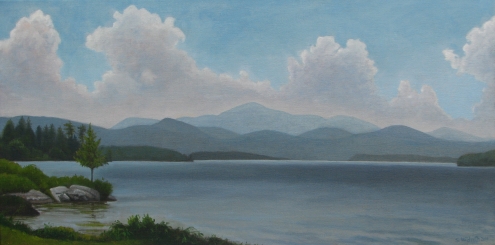
A Sandra Hildreth painting of Lake George. (Looking out from near Pilot Knob.)
Your artwork capture rocks, trees and wildlife. Can you tell us how you became interested in painting and what you enjoy most?
I’ve always loved to draw, even as a child. I visualize or sketch out things when I have problems to solve. So becoming an artist came very naturally to me, although for a career, I chose to do something with a more reliable income and became an art teacher. Now, retired from teaching, I spend much of my time outdoors – hiking, paddling, skiing or painting. Plein air painting allows me to do all these things at once! When I finish a painting, there is certainly a feeling of satisfaction. I do frame them and put them in galleries for sale, but what I value most is the experience of being outdoors painting. Painting is like meditation for me – I always feel invigorated after I’ve spent a day outdoors observing, interacting with, and painting the landscape.
How can our readers browse your artwork or get in touch with you directly?
I’m a member of the Adirondack Artists Guild, a co-op gallery in Saranac Lake, and my paintings can always be found on display there. I participate in regional juried exhibitions and plein air events. Visitors are welcome to come to my home studio/gallery in Saranac Lake, if I can be found at home! Call first! All my paintings can be seen on my web site: SandraHildreth.com or 518-891-1388.
The Adirondacks are a unique place. We’re always interested in fostering the idea of “community” through the Huletts Current. Can you tell us how your idea of community influences your art?
I believe most people live in the Adirondacks by choice – so that in itself creates a sense of community. We have chosen to live in a place that lacks a lot of the amenities that people in urban areas take for granted; we accept the fact that we will make less money, have poor cell service, slow internet, high heating bills, and have to sometimes travel long distances for certain goods or services. But look at what we get to look at! The vastness of this place and how there are many places to go where you won’t see houses, or even other people. The beauty of the wild places of the Adirondacks creates a community among the people who respect and cherish this environment. We care about the same things. In my specific community of Saranac Lake, I’ve been active on the Chamber of Commerce and the Tourism Council because I want to see my friends and neighbors prosper, yet I don’t want to see unbridled development impact the lifestyle we have here. I hope my paintings communicate the respect and value I have for the Adirondacks and instills similar feelings in others.
Thank you for taking the time to talk with us, we would like to extend an offer for you to come up and paint a scene from Huletts Landing anytime you are free. Please take us up on this offer.
Thanks for the invite to come paint – I’d love to do it sometime.
New NY State Website Allows Virtual Tours of Parks and Campgrounds
Want to visit a New York State park or campground? Well, New York has recently launched a new website: http://www.nystateparkstours.com
You can see a virtual tour of many different NY attractions right from your desktop. Many are in the Adirondacks.
Take a look and enjoy.
Fort Ticonderoga Receives Prestigious Education Grant
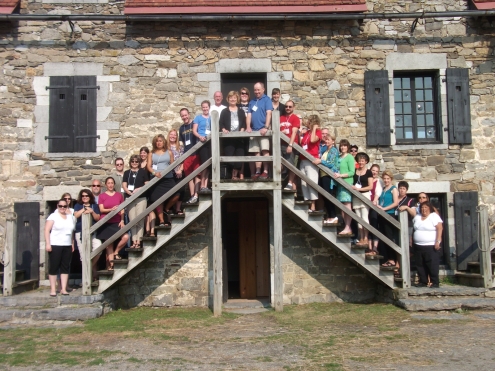
Participants in a 2014 National Endowment of the Humanities Landmarks Workshop at Fort Ticonderoga. The National Endowment for the Humanities has awarded a grant for $169,232 to Fort Ticonderoga to fund two workshops for teachers in July 2015. (Click image to see full-scale.)
The National Endowment for the Humanities has awarded a grant of $169,232 to Fort Ticonderoga to host two week-long Landmarks of American History and Culture Workshops for School Teachers in the summer of 2015. The workshops will focus on “The American Revolution on the Northern Frontier: Fort Ticonderoga and the Road to Saratoga.” Fort Ticonderoga was one of five institutions in New York State to receive grant funding for NEH Landmarks Workshops in 2015.
“This prestigious grant allows Fort Ticonderoga an unparalleled opportunity to play a vital part in educating and inspiring America’s youth through their teachers’ participation in this program,” said Beth Hill, Fort Ticonderoga President and CEO. “Fort Ticonderoga is a national leader in teacher education and this program helps add to our diverse offerings and increased reach.”
“I’m really excited to welcome 72 teachers to Fort Ticonderoga next summer as part of the NEH Landmarks Workshops,” said Rich Strum, Fort Ticonderoga’s Director of Education and the NEH Project Director for the workshops in 2015. “Providing these NEH Summer Scholars with a unique learning experience combining a top-notch slate of visiting scholars and the talented staff and amazing resources at Fort Ticonderoga makes for a very memorable experience. It’s gratifying to think of the long-term impact a week like this has on teachers and their future students for years to come.”
This NEH Landmarks of American History and Culture Workshop for School Teachers will be offered twice: July 12-17, 2015 and July 26-31, 2015. There is no fee for this program and all participants receive a $1,200 stipend to help defray expenses. Teachers wishing to earn three graduate credits during the workshop can do so through an arrangement with Castleton State College in Vermont.
Visiting scholars for the workshops include some of the most prominent historians in their fields and include James Kirby Martin (University of Houston), Holly Mayer (Duquesne University), Douglas Egerton (LeMoyne College), Carol Berkin (City University of New York), William Fowler (Northeastern University), and Jon Parmenter (Cornell University). Participating teachers have the opportunity to discuss issues related to the Revolution with these scholars as well as utilize the inexhaustible resources of Fort Ticonderoga.
Fort Ticonderoga played a crucial role in the early years of the American Revolution on the northern frontier. Ethan Allen and Benedict Arnold captured the Fort and its valuable artillery in May 1775 for the colonial cause. It was a hive of activity in 1776, fending off an aborted British invasion from Canada. In 1777, when news reached London that the Fort fell to the British in July, King George III reportedly shouted to the Queen “I’ve beaten them! I’ve beaten them!” These week-long workshops explore Fort Ticonderoga and the first three years of the Revolution on the northern frontier.
“The American Revolution on the Northern Frontier: Fort Ticonderoga and the Road to Saratoga” is open to all teachers nationwide through a competitive application process open now. Full-time and part-time classroom teachers and librarians in public, charter, independent, and religiously-affiliated schools, as well as home-schooling parents, are eligible to participate. Other K-12 school personnel, including administrators, substitute teachers, and classroom professionals, are also eligible to participate, subject to available space.
Lake George Association Partners with Norowal Cabin Owners’ Association to Install Native Plant Shoreline Buffer

Looking out to Lake George from the Norowal Cabin Owners’ Association property in Bolton.
The Lake George Association has partnered with the Norowal Cabin Owners’ Association to install a native plant buffer along a section of the association’s shoreline along the Lake. In addition to wanting to buffer the shoreline to help protect the Lake from any potential stormwater runoff in the area, the association is also hoping that the buffer will help keep Canada geese off their property.
“We were very excited to partner with the homeowner’s association on this project. Complaints about Canada geese are nothing new around the Lake. In fact, earlier this summer we partnered with USDA/APHIS Wildlife Services to begin a Canada goose survey of the Lake as a first step in developing a management plan,” said Emily DeBolt, LGA’s Outreach Coordinator. “However, there are steps that property owners can take on their own as well,” said DeBolt.

A view in from the lake.
One such step is maintaining – or re-creating – a more natural shoreline. When geese have a direct line from the Lake to tasty, green grass, it is like an open invitation for them. “We can’t really blame the geese,” said DeBolt. “I know it isn’t what people want to hear, but we have created an ideal scenario for them and they are just obliging.”
Luckily, the homeowners at the Norowal Cabin Owners’ Association listened to what DeBolt had to say. The shoreline buffer installed at the Norowal Homeowner’s Association property will hopefully help with the goose problem come spring. By then, the native perennials installed this fall will be getting established, and will be tall enough to deter the geese, but not so tall as to impede the view of the Lake for the homeowners that use the property. “We were thrilled to work with the LGA staff to make this project happen,’ said Cheryl Lamb, Association member. “We have wanted to address our shoreline area for a while now, but we just weren’t sure where to begin. The LGA’s expertise made it possible. We can’t thank them enough for all their help.”

Native blue flag iris is planted on the left. Invasive yellow iris appears on the right.
Another important part of this project was first removing a large section of yellow iris that had taken hold along the shoreline. Yellow iris is an extremely invasive plant that is found along the shorelines of the Lake. The seeds float, so the water carries them, allowing the plant to pop up anywhere the wind takes it. “What was interesting about this yellow iris was that on the same section of shoreline there was also the native blue flag iris as well just a few feet away. You could really tell the difference between the two in terms of size when they were next to each other like that. We were sure to remove the invasive yellow iris but keep the native blue flag iris as part of the new buffer,” said DeBolt. “We will be sure to monitor the planting next year to see if any bits of yellow iris pop back up as well. We did our best to remove it all, but it is always a good idea to monitor an area for a few years just to make sure you got it all.”
“This buffer had many different components to it that will benefit the Lake. We were able to not only remove invasive species, but also then plant native species to both better stabilize the shoreline to prevent erosion and provide a buffer before stormwater runoff reaches the lake. And as if all that wasn’t enough, it will also discourage geese from using the area,” said DeBolt. “We really wish everyone would consider buffering their shoreline with native plants. It’s not only an investment in your property, but it’s also an investment in the Lake. We can’t think of a better win-win than that.”
Lake Champlain- Lake George Regional Planning Board 2013 Annual Report
I recently received in the mail, the 2013 Annual Report for the Lake Champlain – Lake George Regional Planning Board. This organization operates a number of revolving loan fund programs provided by the US Department of Commerce and Department of Agriculture. The brochure details the companies that the Board loaned money to locally and a number of their initiatives which includes a winter road education program. (Readers of the Huletts Current will know the dangers road salt plays in the pollution of fresh water lakes.)
It’s 5 pages but an interesting read. (Click the image above to read the report.)
